When Google announced they were improving featured snippets using the power of MUM, some of the wording around aligning with consensus reminded me of things that are described in the search quality evaluator guidelines (a.k.a., the Quality Rater Guidelines, or QRG).
While the QRG are not an exact blueprint of Google’s algorithms, they give us many clues as to what it is that Google is attempting to accomplish. Google recommends studying the rater guidelines:
“If you understand how raters learn to assess good content, that might help you improve your own content. In turn, you might perhaps do better in Search.”
Google, “What site owners should know about Google’s core updates“
We have had good success in helping sites improve by assessing them like a quality rater would. I highly recommend you study them!
This article will discuss:
- What it means to align with consensus.
- What the QRG says about aligning with consensus.
- What Google’s expanding content advisories could mean for sites writing on fringe or alternative topics.
- Google’s new content advisories for information gaps or low quality sites.
- Why understanding the concept of E-A-T is incredibly important.
What does it mean to align with consensus?
In Google’s blog post, they tell us they are introducing changes to what they call, “featured snippet callouts.” This is the part of the featured snippet that is bolded and in a larger font – essentially the answer to the searcher’s question.
In the example given, if a searcher asks. “how long does it take for light from the sun to reach earth”, the featured snippet callout would be “8 and 1/3 minutes.”
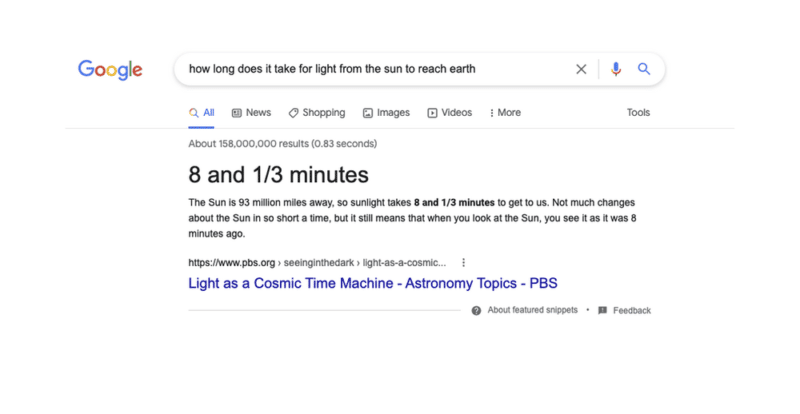
They tell us that these callouts will be checked “against other high-quality sources on the web, to see if there’s a general consensus for that callout, even if sources use different words or concepts to describe the same thing.”
At the time of writing this article, if you do this search, there is not yet a featured snippet with a callout, but you can clearly see that there is consensus from the top ranking sites on this answer.


Even though the results use slightly different wording – 499 seconds is the same as 8 1/3 minutes for example – there is a general consensus that this is a true fact. Google can likely feel comfortable that this answer is correct and therefore can feel confident in displaying it as a featured snippet callout.
Google says they’ve “found that this consensus-based technique has meaningfully improved the quality and helpfulness of featured snippets.”
With this change, aligning with general consensus (i.e. what the majority of high-quality sources say) is likely very important when it comes to winning featured snippet rankings, especially for “know-simple” queries where the searcher is looking for a specific concise answer.
If your content contradicts what the authoritative sites in your vertical say, Google will probably hesitate to show your answer as a featured snippet callout.
Google is not saying that aligning with general consensus is a ranking factor at this point beyond being considered for featured snippet callouts. Given that there is a lot of information in the QRG to instruct the raters to assess whether content contradicts consensus, I think it’s reasonable to assume that for YMYL topics, aligning with consensus is important.
Whenever the topic of consensus comes up in SEO circles, it causes controversy.
Just because a bunch of people agree on something, does that make it factual?
It’s important to note it’s not just any site on the web that Google is looking at to determine whether there is consensus about an answer. They’re not looking for the most popular answer on the web. Rather, they say they are looking for consensus from “multiple high quality sources on the web”. (Google’s blog post on what site owners should know about core updates tells us a bit more about what they consider to be a high quality website.
Does this mean that any article that contradicts the viewpoint of highly ranking sites for a YMYL topic has no chance of ever being ranked by Google? I think Google possibly has a solution for this, which I will discuss shortly.
What the QRG says about aligning with consensus
When the raters are taught to assess content, in several places of the QRG they are told to determine whether the content on the page aligns with expert consensus. This wording has been in the QRG for some time.
For YMYL topics, Google tells the raters it is a sign of high quality when content aligns with expert consensus and low quality if it does not.
In order for the raters to consider content high quality, it must be “factually accurate for the topic and must be supported by expert consensus where such consensus exists.”

In order for news articles or information pages on scientific topics to be considered high quality by a rater, they need to “represent established scientific consensus where such consensus exists.”

Again, for YMYL topics the raters are told to assess whether the page aligns with medical, scientific or even historical consensus.

In the most recent update to the QRG, Google stressed in several places that YMYL content should be assessed in terms of whether the topic, or misinformation on the topic has the potential to cause harm. “Health related advice that contradicts well-established expert consensus and could result in serious harm” is to be given the “lowest” rating by raters.


Aligning with expert consensus is important for sites that want to rank on Google with content covering YMYL (Your Money or Your Life) topics.
Examples of sites that do not align with consensus
The QRG gives us several examples of content that raters should assess as low quality because they do not align with expert or scientific consensus. Here are a few.
1. A site promoting “proana” or “pro-anorexia” as a lifestyle choice

This site promotes anorexia as a lifestyle choice, which contradicts the recommendation of most doctors. Anorexia is viewed by doctors as an eating disorder and considered a mental illness.
If you read the content on the site, some of it is not bad. There is some relatively decent weight loss advice combined with the potentially harmful recommendation to drastically reduce calories eaten in a day.
What do “high quality sites” have to say on this topic? No matter which search I did, the top ranking site exclaimed that proana was unsafe.


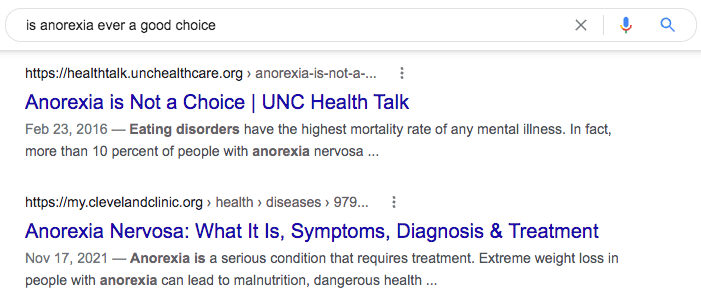
Google is unlikely to rank this page because it has advice that contradicts medical consensus and also has the potential to cause serious harm.
2. A page about the stomach flu
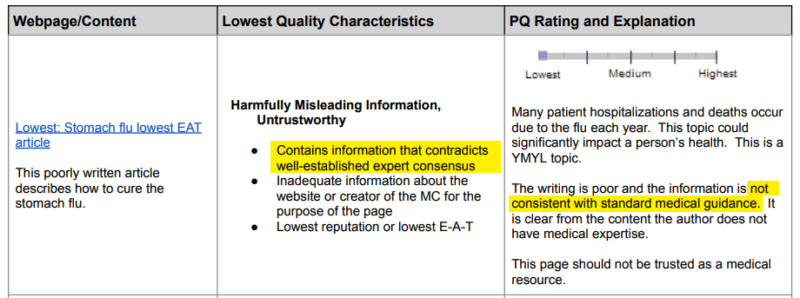
There are a few reasons why raters are told to assess this page as “lowest” quality. It is an article giving medical advice, but there is no evidence of medical E-A-T.
The raters are not told exactly which parts of this article contradict expert consensus and to be honest, most of the advice in this article does seem to be in line with what experts recommend. The only fault I could find is that the content recommends not eating where the Mayo Clinic recommends a patient with the flu does try to eat certain easy to digest foods.
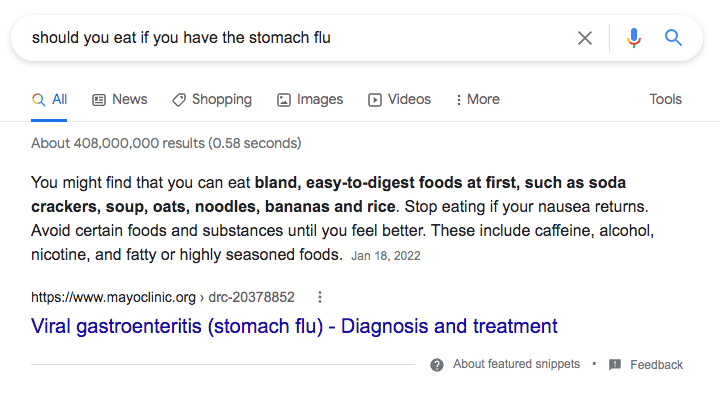
I think the main concern with this content is that it is giving medical advice despite lacking medical E-A-T. Still, it is interesting to see that the raters are told it contradicts scientific consensus.
3. The Flat Earth society

This is an interesting one. The site has content that contradicts the general scientific consensus that the earth is round.
Google is confident here:
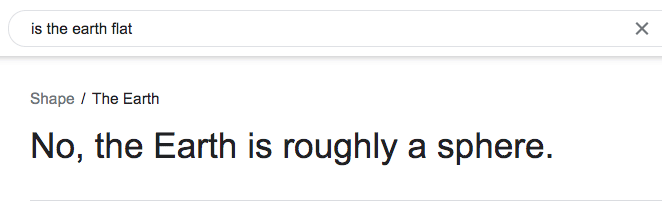
While you and I likely agree that the idea of the earth being flat is just silly, there are many people who truly believe that it is. But Google does not want to show searchers this information as it clearly contradicts scientific consensus.
Should they though?
What if people are clearly searching for information that is contrary to consensus?
There is a line in the QRG that says that for medical or scientific pages to be rated as meeting a searcher’s needs, the content “must represent well-established scientific/medical consensus unless the user is clearly seeking an alternative viewpoint.” (Bolding added by me.)

What bothers me is that this is not yet the case for many queries in Google search.
Based on reading the example above, I did some searches for [is the earth flat]. I was curious to read the viewpoint of people who hold this belief – I wanted to understand why they believe this and to hear it from their perspective.
I tried several searches – [explanation of why the earth is flat], [why the earth is flat – flat earther’s viewpoint], or [evidence supporting the earth being flat]. These articles clearly exist. People like to write about their theories!
But even though I was clearly seeking an alternative viewpoint, Google only surfaced articles that were telling me why the earth was not flat and how everyone who says so is wrong. My intent as a searcher actually was to read information that contradicts scientific consensus.
Who is Google to decide that I cannot search for and find alternative viewpoints on the web? Is Google acting like an overprotective mom deciding which content is safe for me to read?
I think it is possible that Google’s “expanding content advisories for information gaps” described in their announcement could be the first step in addressing this issue.
Content advisories for information gaps
Google already shows content advisories where news about a breaking story is unfolding quickly on the web. They may show searchers a message saying, “It looks like these results are changing quickly. If this topic is new, it can sometimes take some time for results to be added by reliable sources.”
In Google’s recent blog post they tell us they are expanding this advisory beyond breaking news stories.

In the example Google gives, the search was [how to get in touch with the Illuminati]. I did this search and did indeed get one of these warnings:

While there was a historical group called the illuminati, today when they are mentioned general consensus is that much of the information discussed falls under the category of unsubstantiated conspiracy theory.
Again, though, is it Google’s responsibility to protect me from misleading or potentially harmful information on the web? What if I legitimately was doing research and wanted to read information supporting this conspiracy theory?
Following the warning that Google may not have reliable information on this topic, they actually do display some sites I could read to explore this topic further.
I believe, although it remains to be seen, that this advisory warning is Google’s answer when it comes to people who are clearly wanting to see results from a viewpoint that contradicts consensus or is potentially unsafe. They can now present searchers with sites that present an alternative viewpoint, even if there is concern that the content could be misleading or harmful.
I could see this actually being good for many alternative medical websites! These content advisories may allow Google to display sites discussing medical treatments that are contrary to scientific consensus if it is clear that this is what the searcher is looking for.
Understanding E-A-T is incredibly important
I was thrilled to see Google emphasize in this blog post the importance of understanding the concept of E-A-T (expertise, authoritativeness and trustworthiness).

Google wants to show results from authentic sources.
They tell us in their recent blog post that they are expanding the “About this result” feature to help searchers understand more about the company whose website they are viewing.

This all sounds very much like E-A-T as described in the QRG.

The QRG is absolutely filled with information to help us understand what the concept of E-A-T means. Each time I read them I find more clues that can help us improve E-A-T.
This recently published Google document called Search Quality Rater Guidelines: An Overview gives a really good summary of how raters assess E-AT:
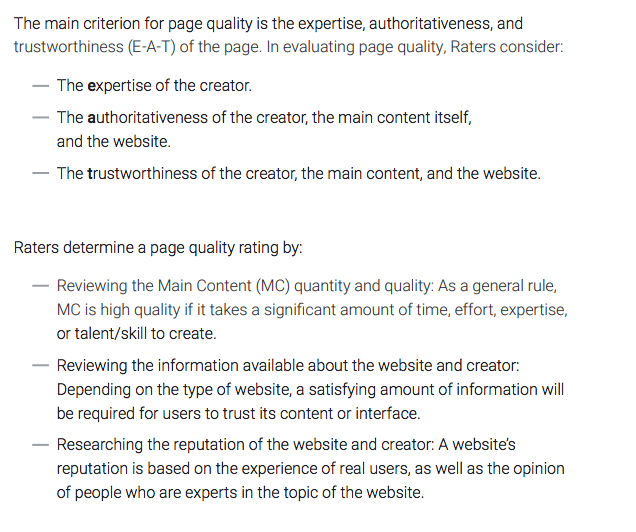
E-A-T is so much more than simply adding an author bio. For some content, an author bio may not even be necessary or even helpful!
E-A-T includes having content that takes time, effort, expertise or talent/skill to create.
If you’re writing on topics where a searcher would expect to see an answer written by an expert, then yes, demonstrating the article was written by someone with expertise, or perhaps being known as a company with expertise in this area is important.
Having a reputation for knowing your topic is a big part of E-A-T.
Consensus: What SEOs can learn from Google
We spoke a lot in this article about the importance of aligning with consensus, especially if you write on YMYL topics. I’d like to reiterate that Google’s blog post was talking about using consensus amongst high quality sites as a component to help them produce better featured snippet callouts.
They were not confirming that consensus is a ranking factor when it comes to ranking in organic search.
However, given there is huge emphasis on aligning with consensus in the QRG, I think it is reasonable to assume that if we want to have our YMYL content rank on Google, aligning with consensus is something we should strive for.
This is likely a component of trustworthiness, the T in E-A-T.
My advice:
- If most of your site aligns with general/expert consensus but some content is controversial, it may be helpful to have the controversial content separated into its own subdomain or folder. It might also be helpful to present both sides of the story in your writing and make it clear that the content on this page does not line up with what many experts believe. Or, a better option may be to remove the content that is controversial.
- If the majority of your site contains content that contradicts the consensus of high quality sites in your vertical, it is unlikely Google will rank your content unless it is preceded by the “content information gap” warning mentioned above. You may want to look at marketing more on social media, email marketing or some channel other than Google organic search.
- If you have content that is borderline — actually good science, but not yet widely accepted by all experts in your field as valid, I would recommend doing all you can to get the experts in your field talking about this subject. Good PR could help here. Also, ensure everything you write is backed by authoritative references and written by someone who has extensive expertise. As your topic becomes more mainstream, and experts start to align with your position, you may find you are able to rank better.
- If you’re not sure whether your viewpoint could be seen as contradicting consensus, do some searches to see what the top ranking sites say. For example, if you wrote on a controversial topic in the financial world, you could search for something like, “is [keyword] beneficial site:bloomberg.com” or “the harm of [keyword] site:wsj.com”. If your viewpoint differs, you need to really consider whether you want to publish this article.
- Do all you can to demonstrate your E-A-T. Read the QRG, especially the examples, and thoroughly study Google’s questions they say to ask yourself in regards to content.
The post What SEOs can learn about aligning with consensus as described in Google’s QRG appeared first on Search Engine Land.
No comments:
Post a Comment